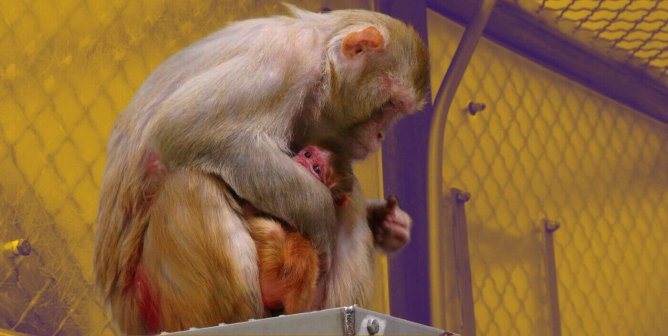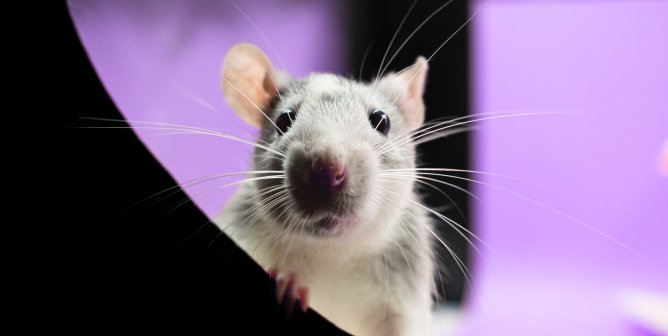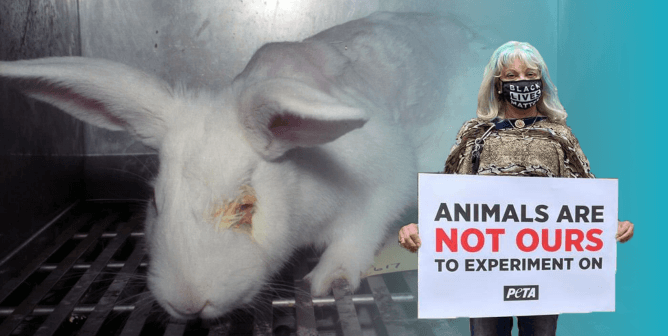Investigation of ONPRC Reveals Horrifying Abuse of Monkeys Used in Cruel and Useless Experiments
The Oregon National Primate Research Center (ONPRC) imprisons 4,200 primates and receives more than $30 million a year in taxpayer funding to torment them in cruel, useless, and deadly experiments.
During a four-month undercover investigation inside the facility, PETA documented that monkeys were driven insane by laboratory conditions. The investigation revealed that the monkeys were confined to small, barren cages and lived in constant fear of employees’ rough handling. The following are among the examples of cruelty that PETA investigators observed at ONPRC:
- Sick monkeys received inadequate veterinary care and pain relief.
- Employees chased terrified monkeys in their enclosures and pinned the animals’ arms behind their backs to force them into transfer boxes.
- Employees used high-pressure hoses to spray water into cages while monkeys were still inside them.
- Monkeys were forced to pick their food out of waste trays beneath their cages.
Monkeys who were confined to small steel cages showed signs of psychological disturbance, such as frantic pacing, spinning, and rocking. Experimenters at ONPRC separate infant monkeys from their mothers in order to cause them intentional psychological damage. They impregnate monkeys and expose them to dangerous levels of nicotine in order to induce birth defects in their babies, who are killed and dissected after their first day of life. They starve monkeys so that they’ll “voluntarily” consume alcohol, and then they kill them to see the effects of alcohol on organ function. You can read more about these cruel experiments here.
Many of ONPRC’s studies have no clinical application to human beings, and many duplicate old experiments that have been conducted and funded repeatedly in the past. In 2002, Good Morning America hosted a three-part series on wasteful taxpayer-funded projects titled “You Paid for It!” The series used ONPRC animal experimenter Judy Cameron’s work, which involved causing terror to infant monkeys with remote-control airplanes, as a prime example. Even today, ONPRC experimenter Kevin Grove receives $750,000 in taxpayer money per year to feed pregnant monkeys unhealthy high-fat diets and then scare their babies with Mr. Potato Head dolls.
In September 2008, PETA obtained internal documents from ONPRC that further detailed abuse and neglect in addition to that observed during PETA’s undercover investigation. These documents revealed the following abuses:
- ONPRC experimenters accidentally performed surgery on the wrong monkey.
- A pregnant monkey experienced a difficult labor, but the experimenter refused to allow the attending veterinarian to perform a Caesarean section to save the baby. When the experimenter finally allowed a Caesarean section to be performed two days later, the full-term baby was dead. The mother died days later of multiple organ failure.
- Many caged monkeys at ONPRC exhibited stress-induced neurotic behavior, such as cage-circling, self-biting, and hair-pulling. In one case, a monkey was described as having pulled out 90 percent of his own hair.
- Despite concerns raised by U.S. Department of Agriculture (USDA) inspectors and a hired consultant, ONPRC continued to perform a painful procedure called “electro-ejaculation” on male monkeys. One monkey, Billy the Kid, was forced to endure this procedure at least 48 times.
As a result of an October 2008 PETA complaint to the USDA concerning the incidents above, the USDA launched an investigation and cited ONPRC for three violations of the Animal Welfare Act: failing to monitor animals adequately, failing to provide animals with veterinary care, and causing monkeys trauma, stress, harm, or discomfort. The USDA also issued ONPRC an “Official Warning for Violations of Federal Regulations,” which warns a facility about civil or criminal penalties if additional violations are found in the future.
Subsequent USDA inspections have cited ONPRC for repeated federal violations, including incidents involving a monkey who died of dehydration, monkeys who suffered excruciating deaths after being injected with unapproved chemicals, and nine monkeys who escaped ONPRC, putting themselves and the public in danger. As a result of its ongoing failure to comply with even the minimum federal standings governing the treatment of animals in laboratories, ONPRC was fined nearly $12,000 by the USDA.
In spite of federal sanctions against the facility, ONPRC continues to violate animal-welfare laws.




